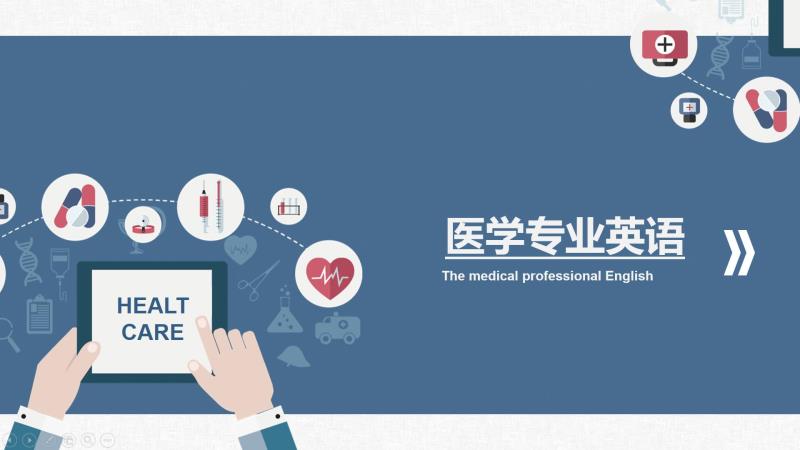
当前课程知识点:医学专业英语 > 4. Literature and Documents in Medical Sciences(医学专业不同类型文献及文件的分析) > Reading Skills for Medical Teaching Materials(医学专业教材的语言特点和阅读) > Video
Hello everyone
Welcome to my class
I'm Cherry chen
In this part
we will focus
on the medical teaching literature
Welcome everyone
In this part
we would focus on
the second part of these five parts
医学专业教材的语言特点和阅读
That is the reading skills
for medical teaching material
We would divide this part
into three little parts
What is medical teaching material
and what are the language features
And then how to read it
Now what is medical teaching material
or what are medical teaching materials
Basically
there are some contents
usually appeared in this part
like definition and history
and epidemiology
etiology and assessment
clinical feature investigations
and differential diagnosis
The last part is about management
of the disease and the prognosis
So what are the language features
I would focus on two parts
two parts
The first is lexical features
And then
we focus on the sentence features
For the lexical features
the first one
is formal words are usually used
For example
those familiar words
the common general words
like tell same
popular illness doctor
would be replaced by inform
identical prevalent
ailment and physician
That means usually in these materials
we would find inform
instead of tell like that
And the second feature
is about the medical terms
Usually you would find the terms
would be very difficult for you
They would combine the prefixed
roots or stems and the suffixes
like this one psychotic
You'll find psycho plus a suffix tic
And epidemiology
You will find epidemic
plus a suffix logy which means study
And pharmacological
you'll find a pharmaco and logy and cal
two suffixes
So the medical terms
would be a little more complicated
but the verbs would be very simple
because this is at least
teaching materials for you
to get familiar with the medical knowledge
So it wouldn't be very difficult
So simple words like require
Involve suggest stop
And another feature for lexical features
I would like to introduce you
a new term
amphibious words
Amphibious means
两栖
So what does 两栖词 mean
Amphibious words means those words
in common context
would have a different meaning
in the professional field
通常的意思在专业领域会附加新的意义
For example
reduction in common field
in common context means 减少
but in professional medical literature
it means复位
And crystallize means
结晶 in common fields
But now in medical field it means
开始形成
结晶 开始形成
indication commonly means
表示
but in professional field it means
指征 适应症
And failure means
失败
in common field
But here in professional field
it means 衰竭
And management
means管理commonly
But here in professional medical literature
you find it means 用药
And next part
So we focus on sentence features now
First
you would find simple present tense
一般现在时
For example
like this sentence
The initial treatment setting
depends on
第三人称单数
depends on the presentation
and severity of illness
And also you find a simple past tense
过去时
现在时
His description placed
more emphasis on thought disorder
and negative symptoms
then on positive symptoms
And also you find another tense like
present perfect tense
For example
the concept of this disorder
has involved during this century
And present progressive tense
like increasingly sophisticated
neuroimaging techniques
are starting
to consistently identify structural
and functional abnormalities
associated with schizophrenia
And another sentence feature
is about the complicated structure
For example
the stressful life events is the subject
And here occur is the predicate verb
谓语动词
And there another predicate verb
may precipitate
So we got two so there is a compound
So this is a compound sentence
是一个复合句
And it's also a simple structure Right
结构还是很简单的
This complicated adverbial part
有一点复杂的状语结构
makes the whole sentence
a little complicated
And with this intrusive ones
有插入语
在这个里面也让句子显得复杂一些
And next one
Because the subject
is a very long noun phrase
这个句子的逗号前面是一个非常长的名词词组
we find the recent identification of
several dopamine receptor subtypes
and successful use of clozapine
This is the subject
the noun phrase
and with the intrusive part
which has little affinity
for the D-2 receptor
but here is also
with this part
right
So but which is a strong antagonist of D1
D4 and 5-HT2 receptors
So here we found the predicate
这时候才到了谓语部分
The recent identification of
something suggests something
suggests a more complex mechanism
than previous thought
So because it's a little complicated
with the sentence structure
when we read this kind of literatures
we should pay attention to
Now read headings
and subheading first as well
And then view tables and diagrams
Here gives you an example here
You focus on the table and you read
for the fifty percent and fifty percent part
You find parents
and you find monozygotic twins
right
同卵双胞胎
然后父母有这样的遗传病史
And also like this table
And another skill is
you try to notice the highlighted parts
like this in the green part
Right
This is for the suggestion
how to deal with this kind of disease
And for the difficult words
you can use the roots
prefix and suffix
to guess the word's meaning
For example
aetiology
aeti means aitia
means cause
And ology means study
So aetiology means the study
of the course of the disease
Antiparkisonian
anti means cure
And Parkison is a kind of disease
So antiparkisonian means about
this is the adjective
ian means the adjective
So this is adjective form
It means about
curing an parkinson
this kind of disease
And neurotransmitter
ter means the subject
the object
the staff
Ok the objects
which try transmit through nerves
Neuro means nerve
And also try to understand
the basic structure
before reading the modifiers
If the sentence is very complicated
you just get the basic structure first
and then
go to the modifiers to find the logic
So for this sentence
for example
Furthermore
drugs are known
to cause psychotic symptoms
What kind of drugs
Then you go to the modify part
like potentiate this pathway
for example
amfetamines
antipakisonian drugs like that
So let's come to the summary
To summarize this part
So medical teaching materials
have some specific lexical sentence
and textual features
which make the materials
more difficult to understand
So by reading the headings
the tables
the diagrams
and highlighted information
and also by guessing the words
analyzing the basic structures
reading becomes easier and more efficient
So we focus on headings
Tables diagrams
and highlighted information
and try to guess the words
analyze the basic structure
That's all for this part
So let's look at the assignments
Also you have to read the sample chapter
crash course psychiatry again
and try to make an outline of it
and compare yours with your classmates
The second assignment
is try to find a chapter
in the medical teaching material
for your major
read and discuss your reading process
with your teacher
Okay
That's all for this part
medical teaching material
Thank you for joining us
-Medicine,Language,English(英语在医学实践中的地位和应用特点)
-Medical English: features and learning strategies(医学专业英语的学习策略和方法)
--Video
-学习资源
-第一章 Medical English: Features and Learnin
-Word-building(构词)
--Video
-Word Analysis (prefixes and suffixes)(单词分析(前缀和后缀))
--Video
-The body and body parts
--Video
-Systems(系统)
--Video
-Pharmacology(药理)
--Video
-Etymology for medical terms (医学词语词源学的研究)
--Video
-Symbols and abbreviations in medical language(医学实用缩略语和常用医学符号)
--Video
-术语学习——访谈
--Video
-2.Medical Literacy and Terminology (专业术语
-Top-down skill in readings:frame and process(从整体到细节的阅读策略分析)
--Video
-Inferring and referring in reading process(推断和归纳在专业阅读中的运用)
--Video
-Making notes in your learnings(学会做学习的笔记)
--Video
-Making use of reading skills in your life (阅读的类型和技巧介绍)
--Video
-批判性思维——访谈
--Video
-学习资源
--学习资源
-Critical Reading Skills
-Reading Skills for Professional Medical Literature(医学专业文献的语言特点和阅读)
--Video
-Reading skills for paragraphs in Medical Papers(医学论文的段落写作特点和阅读)
--Video
-Reading skills for Articles and Medical Journals(医学专业论文的基本阅读技巧)
--Video
-科技类文献阅读
--Video
-Reading Skills for Medical Teaching Materials(医学专业教材的语言特点和阅读)
--Video
-医学专业文献阅读——访谈
--Video
-学习资源
--html
--html
-4.基础练习1
-4.基础练习2
-4.基础练习3
-Strategies and Techniques in Doctor-patient communicatin 1(医患沟通的策略与技巧 1)
--Video
-Strategies and Techniques in Doctor-patient communicatin 2(医患沟通的策略与技巧 2)
--Video
-Strategies and Techniques in Doctor-patient communicatin 3(医患沟通的策略与技巧 3)
--Video
-Strategies and Techniques in Doctor-patient communicatin 4(医患沟通的策略与技巧 4)
--Video
-Strategies and Techniques in Doctor-patient communicatin 5(医患沟通的策略与技巧 5)
--Video
-Strategies and Techniques in Doctor-patient communicatin 6(医患沟通的策略与技巧 6)
--Video
-Doctor‐patient Communication——访谈
--Video
-5.Communication in Clinic Medicines (医学临
-Medical translation practice: from English to Chinese(医学英语汉译实用策略分析)
--Video
-Translation of traditional Chinese medical literature to English(医学文献的中译英问题研究)
--Video
-Balance and features of Chinese and English cultures in medical communication(医学交流中汉、英语言文化特点的比较分析)
--Video
-Principles and approaches:medical translation(翻译问题: 基本原则和方法)
--Video
-翻译——访谈
--Video
-6.Balance Between Chinese and English: M
-Case History writing(案例历史写作)
--Video
-应用文写作——访谈
--Video
-学习资源
--学习资源
-general introduction to academic writing(学术写作的一般介绍)
--Video
-Proposal writing(提案写作)
--Video
-Abstract writing(摘要写作)
--Video
-The path and features of Medical academic writting 1(医学论文写作的路径和特点介绍 1)
--Video
-Writing of medical literature reviews(医学文献综述的写作)
--Video
-学术写作——访谈
--Video
-写作与学术写作
-communication and Medical Study(交流和医学研究)
--Video
-Attending Professional Medical Conferences(如何参加国际会议)
--Video
-Presenting in Professional Medical Conferences(在国际专业医学会议上的展示问题)
--Video
-Attending An Academic Conference——访谈
--Video
-9.communication and Medical Study--基础训练

